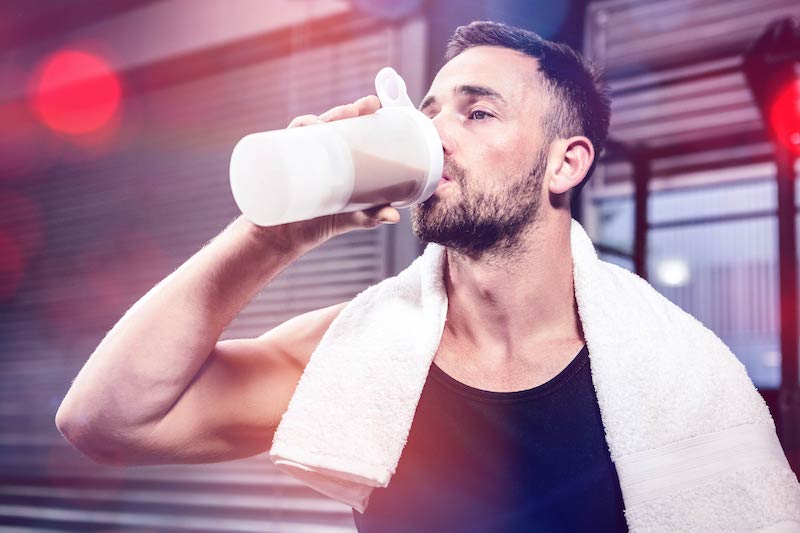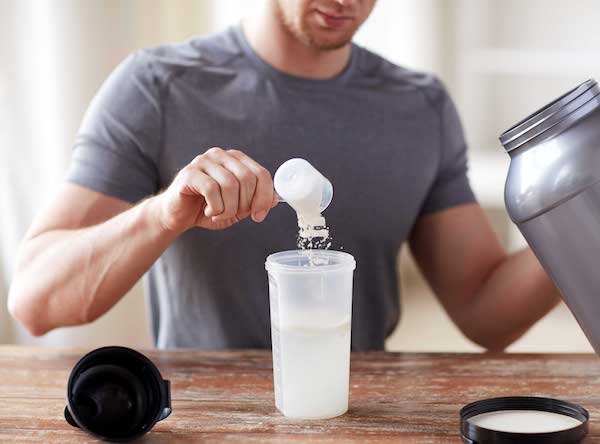No products in the cart.
Can You Build Muscle Without Protein Shakes?

It seems that every year the humble protein shake becomes more and more accepted as an excellent supplement for fat loss and muscle building.
Just fifteen years ago, protein shakes were reserved for bros frequenting Bodybuilding.com and elite athletes.
In the early 2000s, you pretty much had to find a supplement shop if you wanted a protein shake, or if you were lucky your gym would sell massive tubs of whey.
Today, you can purchase a tub of whey protein in your local supermarket. You can buy casein at a pharmacy, you can get Amazon to deliver vegan protein powder to your door within 24 hours! Truly, this is the age of protein powder. Okay, let’s not get too far ahead of ourselves.
But there definitely has been a shift in public opinion. Anyone who took protein powder in the late 90s will know what I’m talking about when I say that protein used to have a bad rep.
People genuinely believed that whey protein could damage your kidneys, get you arrested, or instantly transform you to the Incredible Hulk. People would warn you to be careful about “Roid Rage” whenever you opened a tub in front of them.
These days you’ll see people in their 60s and 70s taking whey protein supplements, or eating protein bars. They may not even know that they’re doing it “Yes, it’s one of those new weight loss bars that my friend recommended to me”, but they are now contributing to an ever-expanding supplement empire.
You should be aware that if you want to build muscle, increasing your protein intake is vitally important.
Protein shakes are an excellent way to increase protein, but are they necessary? Can you build muscle without protein shakes? The purpose of this article is to explore whether this is possible or not.[toc]
What Are Protein Shakes?
There are many different protein powders that are currently available to buy.
The most common form of protein is whey protein, which is derived from milk. But whey isn’t the only milk-based protein powder out there. You can also get casein protein, and often you will find a combination of whey and casein sold as “milk protein”.
There are also egg based protein powders, and a protein powder made from Colostrum (milk made from cows immediately after giving birth).
But there are also plant-based protein powders out there, which suit vegetarians and vegans. Hemp protein powder, brown rice protein powder, pea protein powder, and many other plant-based proteins are commonly sold. They can make a huge difference to vegans (who are often told that they will struggle to consume sufficient protein without animal sources).
Other than turning protein powders into shakes, there are several alternatives.
Protein bars have been very popular for a while now. As have protein cookies, protein cakes, and high protein versions of traditional chocolate bars.
You can also get protein ice cream, protein popcorn, protein bread, protein crisps, and many other protein enhanced foodstuffs. Finding protein powder based supplements has never been easier.
How to Build Muscle
There are many factors that can affect muscle growth, dietary, physical, genetic, hormonal, and mental (how you strategise). But at its most basic, building muscle is about lifting weights while consuming sufficient calories and protein, and utilising rest and recovery effectively.
Get all of this correct, add time, and you will see excellent results.
We’ll give you an example of how exercise and protein can affect muscle growth.
This is a simplistic look, which distils a complicated and thoroughly debated subject into something that regular people (i.e. writers) can understand.
- Consume a pre-workout protein shake or protein heavy meal
- Enter the gym and perform 10 barbell bicep curls
- As you do this your muscle fibres will tear as the exercise causes muscle damage
- Your muscles will become inflamed
- Once your muscles become damaged your body immediately responds
- Protein and other nutrients will travel to your muscle cells carried by insulin
- They will begin to rebuild and repair the damaged muscle fibres
- This leads to bigger muscle fibres overall
- Which long-term leads to bigger muscles
Protein can be taken pre-workout or post workout. It can be taken hours before (provided you take enough) and a few hours afterwards without negatively affecting muscle growth.
Overall protein intake is the most important factor in determining muscle growth. As someone who trains regularly, you will need to ensure that your protein intake increases to match the new requirements.
A study in the Journal of Applied Physiology (1992) by Tarnopolsky et al [1] found that athletes (people who exercise at a high intensity regularly) require twice as much protein per day as sedentary people (people who do not exercise regularly).
Studies have found that exercising can significantly increase muscle protein net balance for up to 48 hours afterwards [2]. Meaning that a particularly intense workout can require increased protein intake for days afterwards.
Considering that you will probably be exercising 4-6 times per week (depending on your goals and lifestyle). This means that your protein intake should constantly be raised to cope with the increased needs.
How Protein Shakes Can Help
A lot of people focus on how protein shakes, (particularly whey protein) are absorbed very quickly by the body. But provided that your overall protein intake is high enough, and that you have eaten within a couple hours either side of a workout, you don’t need fast absorbing protein immediately after a workout.
But there are other benefits to protein shakes, most of them are of a practical nature.
Firstly, protein shakes are cheap. They may not seem cheap when you’re looking at a tub of protein online but look at the cost per serving. This is usually less than a £/$ per serving.
Considering a protein shake usually has 20-35g of protein per serving you’ll struggle to find any food that provides that much protein per £/$.
Also, most protein shakes are very high in protein (obviously) while having minimal carbs and fats. A steak will contain more protein, but it will also contain high amounts of fat.
Greek yoghurt is also high in protein, but also high in fat.
If you have a diet which is already high in carbs or fats, then finding a protein source that contains little of either is very beneficial.
Protein shakes are also easy/quick to make, 30 seconds max from pack to mouth! They are easy to transport, you can place the powder in a shaker and walk around with it all day, just add water and it’s ready.
Protein shakes are practical, have a very high protein to calorie ratio, are cheap, quick to make, easy to carry around with you, and their shelf life is insane. If you are struggling to hit your protein targets then a protein powder is the perfect solution.
Do You Need Protein Shakes to Build Muscle?

While there are certainly many advantages to taking protein shakes each day to build muscle. It is absolutely not a necessity to do so.
It’s possible to get your daily protein requirements from chicken, red meat, fish, lentils, pulses, dairy, eggs, and other food sources.
For most people, it is easy enough to hit their protein targets – particularly if they are of a smaller build.
For athletes and people training for bodybuilding/powerlifting, hitting the required protein without over-consuming carbs and fats might be a bit more challenging. Not impossible, but definitely more difficult.
In this situation, it would be our recommendation that the athlete, bodybuilder, or powerlifter did purchase a tub of protein powder, as it would make things a lot easier. From a convenience point of view, protein powders are unrivalled.
Another group of people who could theoretically survive without protein powder but would definitely benefit from taking one are vegans.
It is commonly believed that vegan athletes will always struggle to build muscle due to a lack of protein in their diet. Of course, this is nonsense, with lots of protein sources available to them (beans, lentils, pulses).
However, there are many vegan-friendly protein powders out there. And at 20-30g per serving, it makes a lot of sense to take them.
Closing Argument on Protein Shakes
Taking a protein shake can make a lot of sense. It can make hitting your protein targets a lot easier, it can also make it cheaper!
The benefits of increasing protein are numerous. Improved body composition, increased strength, increased hypertrophy, a reduction in metabolic diseases risk, and maintenance of muscle during a prolonged calorie deficit.
Taking a whey protein shake immediately before or after a workout may not be as crucial as the supplement industry may have you believe. But it’s still incredibly useful.
As with most subjects in the fitness industry, you will read a lot of polarising opinions on this subject. Some people will tell you that protein shakes are a waste of money, while others will say that they are crucial.
As always the truth lies in the middle and can be different for each individual person.
A vegan bodybuilder would massively benefit from a vegan-friendly protein powder, there is no debate there. Yes, they could attempt to hit their targets through diet alone. Although it would be unnecessarily difficult, and would probably lead to over-consumption of fat (many vegan protein sources are also high in fat or carbs).
On the other hand, a 70kg sedentary guy who eats meat and dairy probably doesn’t need a whey protein or casein protein shake to gain muscle. At 2g of protein per kg, he would only need 140g of protein per day.
The 140g (No Protein Shake) Diet Example
- Breakfast – 150g Oats 17g
- Lunch – Tuna Sandwich 30g & 200g Greek Yoghurt (0% fat version) 20g
- Dinner – Steak Dinner 62g
- Pre-Bed Snack – 100g Cottage Cheese 11g
- Total Protein = 140g
As you can see it is possible to hit 140g of protein in a day. However, it’s unlikely that anyone would find that ridiculously easy to do each day!
Adding a 30g serving of protein twice per day would make it so much easier. Particularly if your protein intake target is much higher than that.
Getting so much protein from an almost fat and carb free source also allows you a bit more leeway in your regular diet. This is a very underrated benefit of protein shakes.
If 70g of protein can be consumed each day, then you can add in more carbohydrate and fat-laden foods while still staying within your calorie and macronutrient targets.
Final Thoughts
The final thing to mention would be that without calorie tracking all your work is basically guesswork.
Honestly, people are terrible at estimating how much protein they get in their diet. Spend a week tracking your calories and then decide for yourself whether you need a protein shake or not.
Also, make sure that you are exercising at a sufficient intensity. If you dont then all the protein in the world won’t help you!

Personally, would rather a few extra whey protein shakes daily than an extra meal. There’s only so much food I can eat each day without feeling sick.